Detroit: Become Human review- do Androids dream of David Cage?
Dear audience, are video games… Art? Please don’t stop reading just yet, I’m doing a bit here. The question of video game artsiness is an open one, I don’t intend to seriously tackle it, that’s not really the point of a game’s review. However, case in point: Detroit: Become Human. Or more specifically: David Cage. And even more specifically case in point: emotions.
Yes, it’s going to be one of “those” reviews. I do not intend to wax lyrical about Detroit: Become Human, but I do intend to showcase what happens when maybe a video game takes itself a bit too seriously. Or when its author takes themselves too seriously. Don’t worry, this is gonna be informative for you.

The fanciest Detroit since Deus Ex.
Before we venture into too deep waters, let’s start by addressing the question of graphics. Detroit looks absolutely fantastic and the attention to detail Quantic Dreams has put into making the setting of the game realistic is impressive. While water reflections, animations and textures are amazing, more has to be said about the facial features of the characters. Rendered with motion-capture, with millions of polygons, the faces look real. Honestly, occasionally too real.
Now, thing is, for a game steeped in its narrative as much as Detroit: Become Human is, how relevant is that? And here is where I have to stress one thing- the plot itself isn’t as relevant as the characters inside it. Their development and their struggle is the strong suit of the game (of any Cage’s game really). And for that specific reason, it was absolutely crucial to get the graphics as real as possible. The further the line between “a representation of a person” and “a person” can be blurred, the better games like Detroit work, so I’m glad to see it push PS4’s limits to the absolute maximum.
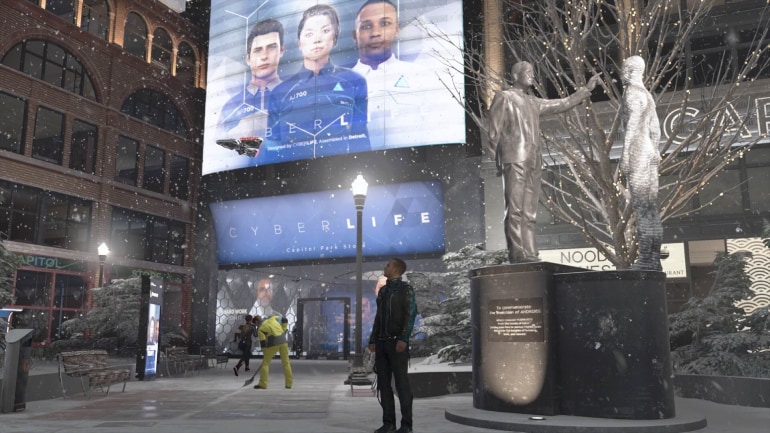
QTEs for the most mundane of things.
Next up, before we dive into the weird psyche that is David Cage, let’s discuss the core mechanics of the game. If you played previous Quantic Dreams titles- Indigo Prophecy, Beyond: Two Souls, critically acclaimed Heavy Rain, you know the drill. The game pretty much runs on tracks, you can explore locations and interact with the world and many problems, especially fast-paced action sequences, are solved by timed QTE button prompts. This is true for dialogue as well of course.
And I honestly have to say, these are horribly over-used. You will be made to perform QTEs to accomplish the most menial of tasks, like changing clothes and cleaning bathrooms. Yes, that is a thing you will be doing in Detroit. There is a point at which I seriously have to ask: why? The game runs itself often times. While I understand that having players perform certain tasks via QTEs, even without a failure possibility, can be a good way of immersing them in the story and getting them to feel personally responsible for the characters, there comes a time when it just becomes tedious. There are entire sections of this game that would lose nothing if they were turned into a cut-scene. Of course then the illusion breaks and you become painfully aware of just how little gameplay there is in this game.
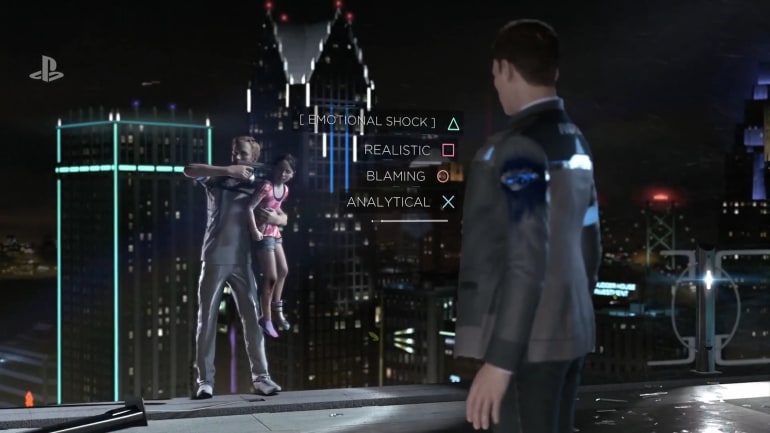
Press X to SADNESS.
When you have choices that can lead to drastically different results, boiling it down to your reflexes is actually not the best idea. It breaks immersion, when I’m engaged with a story and expect something to happen and then something different happens not through a logical progression of events, but just because I failed a QTE, this is not a fun feeling. It feels like being cheated.
Moreover the game is sometimes terrible at explaining consequences of your actions, especially in timed dialogues. Entire sentences boiled down to a single word do NOT convey the message that you want to get across. Often enough that one word will imply one thing, but the character will say something entirely different, leading to interactions you did not intend to have. Language is difficult. We create narratives to make it easier, to learn about it, not to replicate the difficulty of using it.
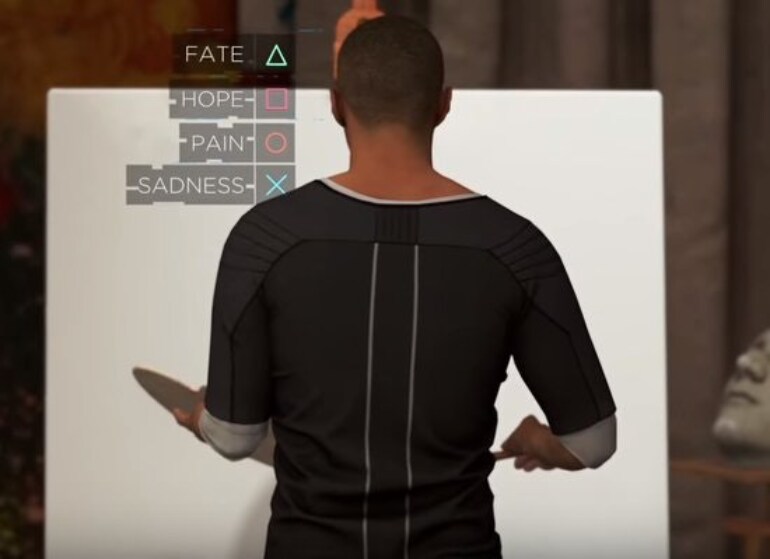
David Cage himself.
Ok, now we’re getting to the important stuff. It’s virtually impossible to talk about Quantic Dream’s games without talking about David Cage himself. A man as controversial as marketable, as lauded as despised. Now, it is not up to me to talk at length about David Cage, I want to ask a simple question here: is Cage a good writer?
Well… Sort of? It’s not an easy question, ok? Look, Cage’s writing is good, but he has the tendency to imply things and shroud them with vague woo that sounds profound, but breaks down when you start to analyze it. He has strange fetishes he can’t help but insert into his games, his characters often talk in stilted and awkward fashion, romance is always forced, but he’s good at implying there’s more going on behind the scenes. He overuses the themes to the point you can create bingo cards to guess elements in his next game (some people actually do that and it works). The key-word to understanding David Cage is: Pretentious. And in Detroit: Become Human… This is a blessing in disguise.
Whoever thought Cage should write Androids was a genius. Because Cage really struggles to write real people. But Androids allow him the opportunity to exaggerate the interactions and emotional states of characters to the point where it makes sense. The visual presentation of the game helps a lot in this goal- the faces of our Android characters are stilted and uncanny, they seem real, but fake. Exactly as they should be. This helps to develop them as becoming less stilted as the game progresses, and indeed, become human. Not too human, because Cage, but human enough.
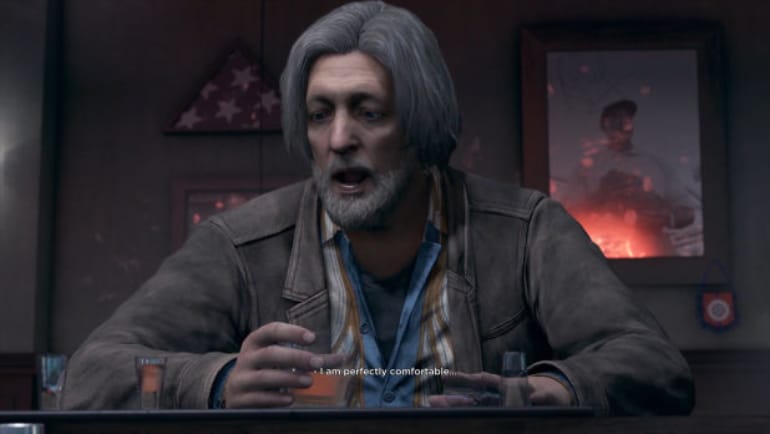
How many “emoshuns” is people?
The burning hot essence of Detroit: Become Human, is the character-driven story with choices that matter. That is as close as I can get to boiling the experience down to its essentials. Now. How does it fare in doing that? Detroit features three distinct plotlines devoted to three different Android characters- police negotiator Connor, assisted living android Markus and service android Kara. Each of them comes with a unique perspective on the events unfolding in Detroit and plays a different role, presenting a different facet of the narrative.
Now this is very good and is done quite well, these characters are well-established (for Androids), likable and their paths as well as their choices form unique snippets of their lives. It does genuinely create a compelling narrative of people changing and adjusting to their surroundings. The in-game system of seeing all the branching paths in a given chapter reinforces the illusion of choice and allows the players to compare their decision-making process with that of other players.
But fundamentally the story never really asks questions that haven’t been asked before. If you’ve seen Blade Runner or West World, you understand the basic tropes of an android story- the questions of identity and self-actualization, free will vs programming, attaining personal freedom and everything in between. And while this is all good, in Detroit these tropes are framed in a discussion about abuse, exploitation and, yes, race.
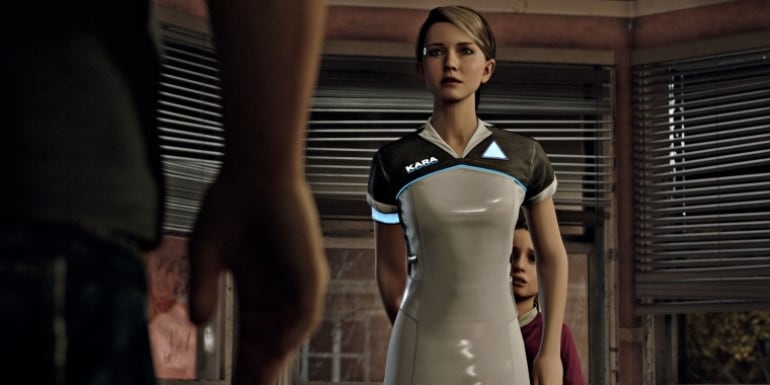
Oh it’s totally about race.
Here’s the thing. I’m gonna say it right now and get it out of the way: David Cage does not understand racism. Systemic racism is a system of oppression. I’m not gonna go down the rabbit hole of critical race theory, because we could spend here all day, but I’m gonna give you an example: say you have disproportionally high number of black citizens in your prison population. This is not a result of black people being more prone to commit crime, obviously, but neither is it a result of closet racists working for the police force. It’s a feedback loop of the police force concentrating more on “black crime” each year, itself being result of poverty and alienation in black communities.
Got that? Ok. So here’s the thing- when Cage approaches the subject like racism, through the lens of a character like Markus- a black Android who suffers injustice at the hands of the police (very subtle) early in the game, Cage can’t help but blame it on the people, instead of systems, and then excuse these people. Like yeah, people are anti-android, but that’s because they are poor and unemployed and Androids stole their jobs. See? They have a reason for being racist, if only Androids didn’t steal their jobs, this wouldn’t have happened.
And then Cage never goes into the wider political context of Android (black) exploitation. It gets thrown by the wayside of telling a character-driven story. And ultimately that’s his prerogative, but Cage utilizes the “language of oppression” heavily. The Civil Rights Movement imagery is everywhere- from the posters, through statues and into special Android-only bus spaces, of course, in the back. There IS a political message here, but it’s handled with a grace of someone desperately trying to stay inoffensive, while talking about a very charged subject. Simply put: it fails.
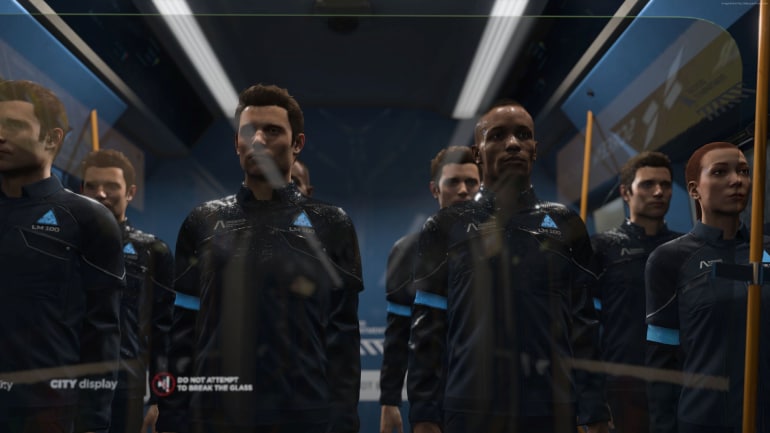
On the illusion of choice and why framing matters.
Let’s go back in time. 8 years ago, to be exact. Heavy Rain just came out and it’s getting universal acclaim. Critics love it, players? Eh, they think it’s ok. Not ground-breaking, but fun and at times genuinely absorbing. The players feel sometimes heavily rail-roaded and their choices don’t seem to matter as much as advertised. And the mundane QTEs that will come back in Detroit ruin the illusion completely.
But come Detroit and all of these suddenly make sense. Because a story about Androids is a story about programming- what does it mean to be “free”? And quite brilliantly, this question is thrown back at the player through game mechanics. In Heavy Rain there were inaccessible places where you couldn’t go, but in Detroit you can see visual representation of this with large, red letters telling you to obey instructions. Because you’re a robot, it makes sense that you can’t just deny your programming.
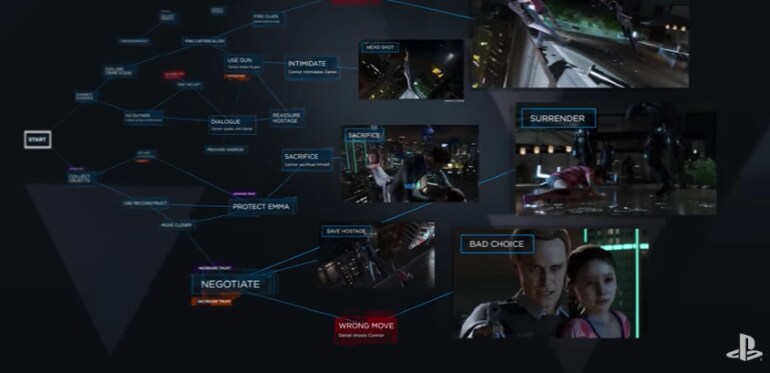
No more strings on me?
This, this right here is what makes framing important. Quite early in the game you have the opportunity to go “deviant” with the Androids and break through their programming. And from then on, you no longer see anything telling you to obey instructions, but here’s the thing- your choices are still limited. You can’t go anywhere you want, you still have to accomplish objectives. Which comes back to the player as a genuinely good question: how much “freedom” do you think you have exactly? Is this really any different from being explicitly told where you can or can’t go? If you follow instructions anyway, what does it matter if it feels to you like they are yours or not?
I mean, Futurama said it best: I choose to do what I was programmed to do. And while, again, this is not new, this does remind me of Bioshock in a strange way. It is actually handled very well for a David Cage game. While it may have been done before, the game still goes out of its way to leave a seed of doubt in the player. It goes beyond entertainment, beyond emotional investment and into a discussion. And, well… I can’t not praise a game for that.
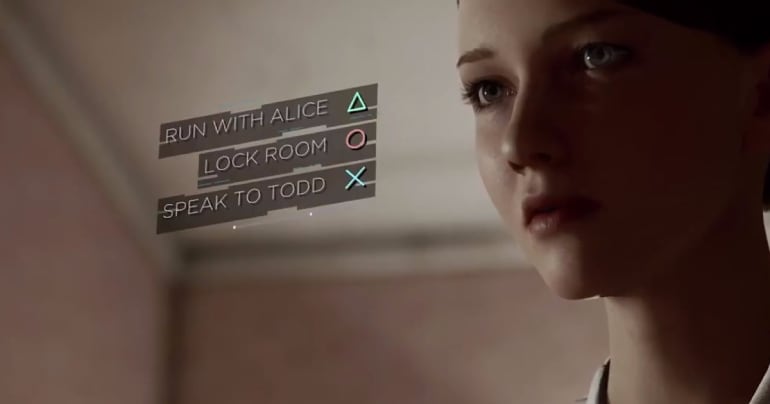
Human: Become Detroit.
Ultimately Detroit: Become Human is probably the best David Cage game so far. Everything from the subject matter to the aesthetics seems specifically designed to let his style shine, while the framing of the story allows a lot of inherent Cage weirdness to get buried beneath an honest-to-god, gripping narrative.
This is absolutely not a game for everyone. Coming from something like God of War, yeah, it would be a culture shock and even fans of the genre could have some issues with the dialogues and the pointless QTEs, but it does what probably no Quantic Dreams game has managed thus far- it retains the illusion of choice throughout the whole playthrough. And if you want to scoff and exclaim that you want real choices, well… Maybe that’s exactly why you should play it.







Your point of view caught my eye and was very interesting. Thanks. I have a question for you.
Thanks for sharing. I read many of your blog posts, cool, your blog is very good.